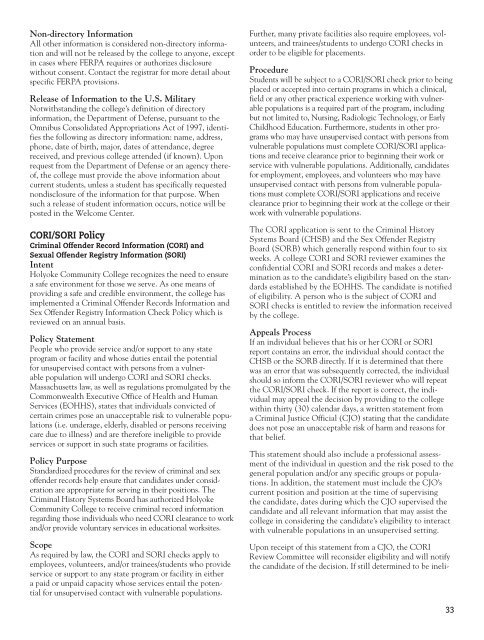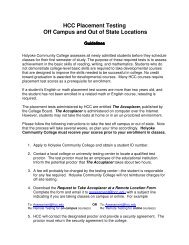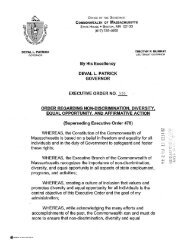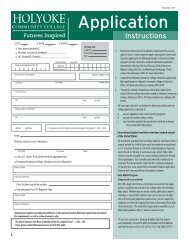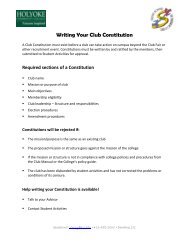Student Handbook 2010-2011 - Holyoke Community College
Student Handbook 2010-2011 - Holyoke Community College
Student Handbook 2010-2011 - Holyoke Community College
You also want an ePaper? Increase the reach of your titles
YUMPU automatically turns print PDFs into web optimized ePapers that Google loves.
Non-directory InformationAll other information is considered non-directory informationand will not be released by the college to anyone, exceptin cases where FERPA requires or authorizes disclosurewithout consent. Contact the registrar for more detail aboutspecific FERPA provisions.Release of Information to the U.S. MilitaryNotwithstanding the college’s definition of directoryinformation, the Department of Defense, pursuant to theOmnibus Consolidated Appropriations Act of 1997, identifiesthe following as directory information: name, address,phone, date of birth, major, dates of attendance, degreereceived, and previous college attended (if known). Uponrequest from the Department of Defense or an agency thereof,the college must provide the above information aboutcurrent students, unless a student has specifically requestednondisclosure of the information for that purpose. Whensuch a release of student information occurs, notice will beposted in the Welcome Center.CORI/SORI PolicyCriminal Offender Record Information (CORI) andSexual Offender Registry Information (SORI)Intent<strong>Holyoke</strong> <strong>Community</strong> <strong>College</strong> recognizes the need to ensurea safe environment for those we serve. As one means ofproviding a safe and credible environment, the college hasimplemented a Criminal Offender Records Information andSex Offender Registry Information Check Policy which isreviewed on an annual basis.Policy StatementPeople who provide service and/or support to any stateprogram or facility and whose duties entail the potentialfor unsupervised contact with persons from a vulnerablepopulation will undergo CORI and SORI checks.Massachusetts law, as well as regulations promulgated by theCommonwealth Executive Office of Health and HumanServices (EOHHS), states that individuals convicted ofcertain crimes pose an unacceptable risk to vulnerable populations(i.e. underage, elderly, disabled or persons receivingcare due to illness) and are therefore ineligible to provideservices or support in such state programs or facilities.Policy PurposeStandardized procedures for the review of criminal and sexoffender records help ensure that candidates under considerationare appropriate for serving in their positions. TheCriminal History Systems Board has authorized <strong>Holyoke</strong><strong>Community</strong> <strong>College</strong> to receive criminal record informationregarding those individuals who need CORI clearance to workand/or provide voluntary services in educational worksites.ScopeAs required by law, the CORI and SORI checks apply toemployees, volunteers, and/or trainees/students who provideservice or support to any state program or facility in eithera paid or unpaid capacity whose services entail the potentialfor unsupervised contact with vulnerable populations.Further, many private facilities also require employees, volunteers,and trainees/students to undergo CORI checks inorder to be eligible for placements.Procedure<strong>Student</strong>s will be subject to a CORI/SORI check prior to beingplaced or accepted into certain programs in which a clinical,field or any other practical experience working with vulnerablepopulations is a required part of the program, includingbut not limited to, Nursing, Radiologic Technology, or EarlyChildhood Education. Furthermore, students in other programswho may have unsupervised contact with persons fromvulnerable populations must complete CORI/SORI applicationsand receive clearance prior to beginning their work orservice with vulnerable populations. Additionally, candidatesfor employment, employees, and volunteers who may haveunsupervised contact with persons from vulnerable populationsmust complete CORI/SORI applications and receiveclearance prior to beginning their work at the college or theirwork with vulnerable populations.The CORI application is sent to the Criminal HistorySystems Board (CHSB) and the Sex Offender RegistryBoard (SORB) which generally respond within four to sixweeks. A college CORI and SORI reviewer examines theconfidential CORI and SORI records and makes a determinationas to the candidate’s eligibility based on the standardsestablished by the EOHHS. The candidate is notifiedof eligibility. A person who is the subject of CORI andSORI checks is entitled to review the information receivedby the college.Appeals ProcessIf an individual believes that his or her CORI or SORIreport contains an error, the individual should contact theCHSB or the SORB directly. If it is determined that therewas an error that was subsequently corrected, the individualshould so inform the CORI/SORI reviewer who will repeatthe CORI/SORI check. If the report is correct, the individualmay appeal the decision by providing to the collegewithin thirty (30) calendar days, a written statement froma Criminal Justice Official (CJO) stating that the candidatedoes not pose an unacceptable risk of harm and reasons forthat belief.This statement should also include a professional assessmentof the individual in question and the risk posed to thegeneral population and/or any specific groups or populations.In addition, the statement must include the CJO’scurrent position and position at the time of supervisingthe candidate, dates during which the CJO supervised thecandidate and all relevant information that may assist thecollege in considering the candidate’s eligibility to interactwith vulnerable populations in an unsupervised setting.Upon receipt of this statement from a CJO, the CORIReview Committee will reconsider eligibility and will notifythe candidate of the decision. If still determined to be ineli-33


